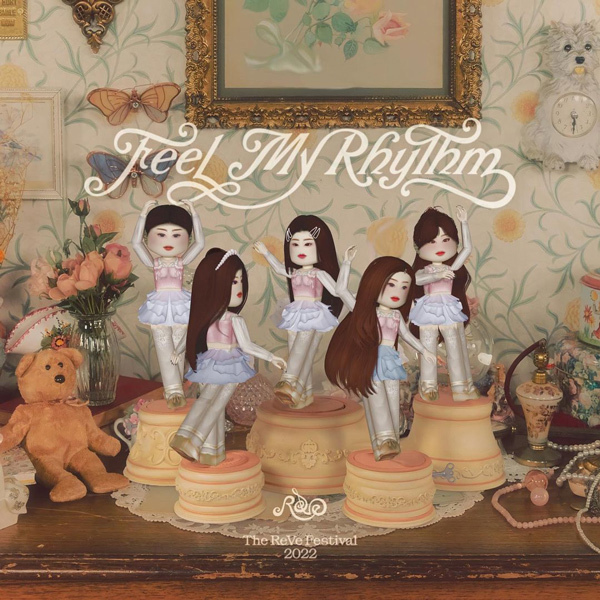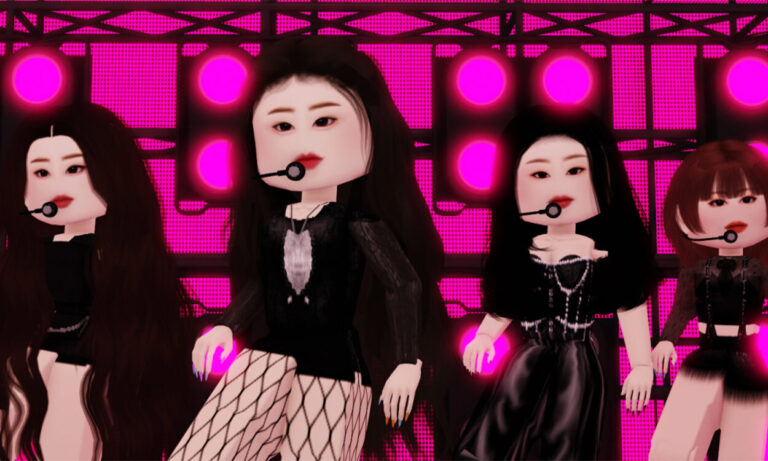I attended a Kpop concert on Roblox. Here’s how it’s changing stan culture as we know it
If you’ve ever fallen into the unhinged chasm that is Kpop and emerged as a soft, hard, or multi-stan from the other end, chances are that you’ve always wanted to indulge yourself in the countless multimedia experiences offered by the music genre. More specifically, concerts. For many enthusiasts however, a wall projector and a BTS Jungkook figurine taped to a string were the closest they’d ever get to attending a show… until online gaming platform Roblox entered the chat.
Once synonymous with role-playing games like Adopt Me!, Roblox is now witnessing the rise of concert companies, entertainment agencies, and Kpop idols—with avatars, outfits, discography, and dance routines emulating their favourite real-life groups. Here, fans can be seen curating stages, and hosting shows and even world tours while Roblox trainees spend days at a stretch prepping for their debut.
As someone who’s never attended a Kpop concert despite being a multi-stan since 2017, my first brush with the pixelated rendition of the genre came from the depths of TikTok. Set to TWICE’s ‘Alcohol-Free’ and NewJeans’ chart-topping ‘OMG’, the clips featured avatars flooring routines in front of a live audience. 20 TikToks into #robloxkpop, I craved to experience a fandom-fronted concert hosted on the gaming platform.
And that’s exactly how I found myself wrecking my keyboard to type fanchants and become a digital paparazzi for my bias in ReVe (styled after the five-member girl group Red Velvet) on Roblox.
The feral highs and robotic lows of digital concerts
Although all of the tickets including VIP, general admission, and obstructed view are free of cost for most Roblox concerts, the experience at its core is designed to echo their physical counterparts. In ReVe’s case, the free VIP passes to their show were sold out in a matter of seconds.
As soon as I spawned into the experience on the day of the concert, I was greeted by jumping silhouettes in front of an impressive stage set at a distance. “If it’s an original stage, like the ReVe concert stage, we first come up with a design idea or sometimes just play around on Roblox Studio until something good comes out of it,” explained Al, the CEO of Roblox concert company and entertainment agency Sweetener Events and Sweetener Entertainment respectively.
On the other hand, if the set is a recreation of an existing, real-life stage, Al mentioned that Sweetener Events’ creative team spends considerable time taking screenshots of videos and digging up pictures of its details before building the same. “We host rehearsals to make sure everything works—including lifts, screens, lights, and effects,” he continued. The results are some of the finest productions in line with Roblox’s ideology of “powering imagination.”



In terms of the actual performances, I was surprised to witness the full range of motion in Roblox’s LEGO-like avatars. Be it the dynamic poses in ‘Psycho’ or the smooth footwork in ‘Zimzalabim’, all five members of ReVe—managed under Sweetener Entertainment—nailed choreographies down to their ending fairies.
Coupled with backup dancers, confetti, fan interactions, and a camera, their sequences exuded stage presence to form one of the best digital experiences the Kpop fandom can offer today.
Sure, if you’ve attended a real-life concert before, it’s easy to nitpick at a few details. For instance, if an avatar has long hair, it remains static throughout the show and occasionally covers other characters. Similarly, if the dance moves require members to sit on the stage, chances are that they would glitch halfway into the ground. The Captain Hook hands don’t help the case either.
That being said, it should be noted that the idols on stage are not scripted bots. While the dance routines and music can be credited to both in-game features and Discord, the performances still require users to practise formations, lyrics, and outfit changes. “There was a lot of thought and effort put into our show,” Rene, the Roblox idol styled after Red Velvet’s Irene, told SCREENSHOT.
“All of the formations and lyrics took about a week to carefully prepare, and it took us a total of three to four days for rehearsals to make sure we could give ReVeLuvs (our fans) the best performance possible.” Considering that their sync was off the charts on-stage, ReVe’s commitment undoubtedly paid off.
Liberation in the age of digital fandoms
In my chat with Al, the CEO admitted that he used to work for an Ariana Grande Roblox group as a light tech before focusing on his own venture over the COVID-19 pandemic. “It was really fun to recreate real-life events in Roblox, and at a time when concerts weren’t able to be held in person, it was great to entertain everyone’s quarantine,” he said.
Out of all the concerts Sweetener Events has hosted in the past, Al’s favourite remains the TWICE 4th World Tour held in collaboration with Venus Entertainment and the opening night of the BORN PINK World Tour. “Both of these shows did extremely well in terms of attendance (around 200 in each server) and they were so fun to prepare.”
Another defining factor of the experience is the community gathered on Sweetener Events’ Discord server—where members are encouraged to share their database of concert screenshots, give game suggestions, and report technical issues and trolls.
Somewhere between finding lifelong internet besties and attending concerts on Roblox together, the community is redefining the concept of a digital-first fandom. It is also this environment that has birthed infinite possibilities for fans to engage with the Kpop industry as creators—without the physical burden of performing. But this hasn’t stopped Sweetener Events from chasing perfection during its rare audition process.
“We allow people to dance and sing to one song of a list we put out previously,” Al explained. “They need to know how to do lyrics (for one member only) and move to the respective dance forms all while the lyrics are on-time and don’t tag—which is when Roblox sends ‘####’ messages instead of certain words.”
On the other end of the conversation, ReVe members admitted that their hustle as Roblox artists is now a natural part of their routine. “Daily life as an idol [is something that] I find easy,” said Jess, styled after Red Velvet’s Joy. “I’ve been doing it for over two years, so I find it manageable to balance my personal life with my idol life. I know how to equally split it and do the things I want to do within both.”


ReVe idol Choo, Yeri’s Roblox counterpart, also noted that the group has never witnessed any disputes between members. “We enjoy working with each other to create and practise the performances we give you, and if there’s something that is bothering someone, we would open up and try to work on them.” According to the star, it’s easier to solve issues in a virtual environment—given that they can take their own time to learn things and review each other’s opinions, be it in terms of formations or practice hours.
But it’s not all sunshine and roses in the geometric world of Roblox idols. When it comes to listing hurdles faced by the stars, an unstable internet connection barely scratches the surface. “One of the biggest challenges I’m faced with is probably talking to people about it being one of my hobbies,” admitted Pepsi, the idol behind ReVe’s Seulgi.
“It’s not exactly something that people will find interesting—they would most likely question why I do it. If I tell them I can’t meet up with them because I have a Roblox concert, they would probably make fun of me.”
Virtual idols and the divisive future of Kpop
Although South Korean music has witnessed the rise of digital idols since the late 90s, the phenomenon didn’t grip the rest of Kpop until the 2010s. Be it fully AI-generated girl groups like ETERN!TY and K/DA, or partly virtual groups including aespa and SUPERKIND, the technology is hailed as the revolutionary realm of an industry that is otherwise plagued with scandals, mistreatment, mental distress, and exploitative contracts.
However, the artists continue to polarise opinions. Pointing out Kpop’s toxic affair with plastic surgery, weight control, and gruelling training schedules, some fans believe that the innovation is subjecting real-life groups to further unrealistic standards. At the end of the day, they believe virtual idols are incapable of building connections as strong as their physical peers—with whom audiences share the same human tribulations.
What separates Roblox idols from the former narrative is the fact that they are fandom-centric, with the broad purpose of making Kpop a decentralised form of entertainment. “In the way we’re using it, I would say we’re trying to reach out to more people for them to have fun experiences [related to] their favourite artists, and attend concerts, fan meets, fan signs and award shows,” Al said, highlighting that the events are merely a new venue to enjoy Kpop and make the industry more accessible.
At the same time, he believes that Roblox’s potential to house a completely virtual idol can’t be ruled out. “Just look at MAVE:, they’re AI-generated and the popularity they’re gaining is insane,” he noted. Ultimately however, Al sees Roblox concerts as an enhancement rather than a fully-blown replacement for physical experiences. “I still think nothing beats a concert in real-life, the vibes are just different.”



Five years down the line, Al visualises Sweetener Events and Sweetener Entertainment delivering bigger events without him at the helm. “I have been getting busier with college and my personal life, and I do pretty good at balancing it, but I do think I’m getting to an age where the motivation is slowly fading away.”
As for those who are interested in debuting as a Kpop idol on Roblox themselves, Sarah—Wendy’s Roblox peer—had this to say: “Have basic knowledge of what it means to be an idol, know the use of lyrics, and practise them. Be capable, have enough time to dedicate yourself to [the experience], and have fun!”
So if you, like me, constantly gaslight yourself into believing you’re attending a concert while streaming fancams on YouTube, I recommend giving Roblox a whirl. You’ll be fine as long as your laptop doesn’t start smelling like a heap of burnt plastic.





